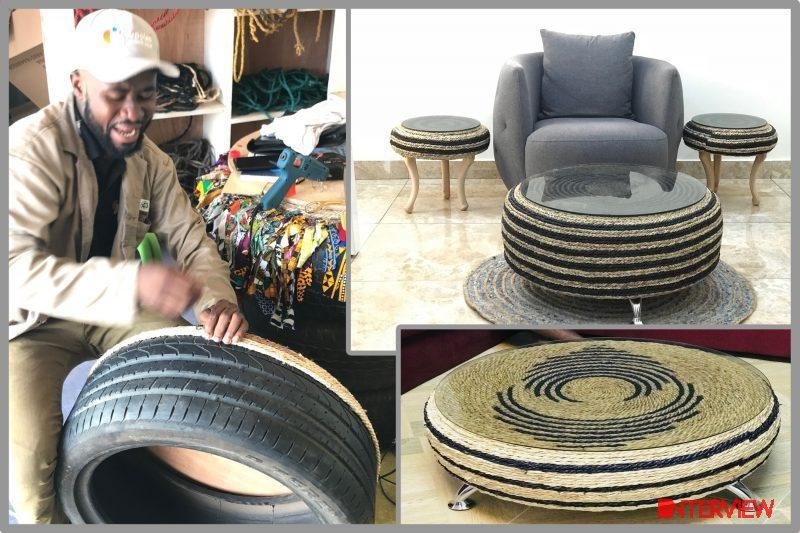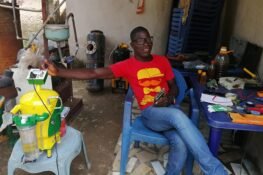Ghanaian entrepreneur, Jeffrey Kwabena Yeboah, shares with The Interview how he ventured into recycling old car tyres into household furniture…
What inspired the idea of making household furniture from used car tyres? How did you start?
All my life I have been an entrepreneur one way or another. I lost my mum at a very young age and things became very difficult for my dad after he lost his job in 2006.
My aunts took me in from Junior High School to Senior High School and had to cater for myself in the university from 2013.
Did lots of petty jobs to find my way through school and started an Interior Decor business where I paint and fix wallpapers in rooms of Commonwealth Hall at the university.
My work grew out of campus and I started outsourcing furniture for clients. As time went on, a client by name Akwasi Bonsu Cypro wanted a table so we roamed the streets of Accra but we didn’t get what he wanted.
We then got to place called Dzowulu in Accra and we saw about 100 heaps of car tyres and vulcanizers were about to set them on fire.
The black fumes from the tires caught my attention and that was when I got the idea that we could actually the waste tyres into tables. I told the client my idea and he gave me the challenge.
Why did you opt for old car tyres recycling business? Why were you not keen on graduating from school and getting a white collar job?
Well, I started the business off on campus out of the fact that I was hungry and needed enough to support myself on campus.
I have always wanted to start a trade on my own and also employ people. It’s been my dream to be a part of the problem solving community and I know by creating a job, I would be in that line of thoughts because there are a lot of graduates without jobs.
The bottom line is, there are fewer jobs and that’s very scary for me as a youth. I opted for the car tires because of the danger it poses to the environment.
The black fumes that emanated from the burning when I first saw it caught my attention and decided to go for it.

Some of Jeffrey Kwabena Yeboah’s products / Photo credit: Yeboah
How did you cope with the societal perception that sees non white-collar jobs as jobs as beneath educated youth?
I had a lot of pressure from some family members and friends who didn’t understand my vision by then. Nonetheless, I saw by then that they all meant well and would want to see me prosper.
It’s not any fault of theirs that they can’t see clearly what your vision is.
So I got through this by perseverance. I had and still have so much passion for what I do and I always want to improve on it.
I did well to really understand my field and created a loving atmosphere for it. I always tell myself that whatever it is that I want to do in life, I either do it with passion or forget doing it at all.
Education is important. But going to school with the thought of joining the workforce is very dangerous especially if you have a background like mine
What were the challenges you encountered at the initial stage and how did you surmount them?
My main initial challenge was adding flesh to the business. With support from Switch Africa Green Project under the auspices of Ghana National Cleaner Production Centre I got the opportunity to enroll in an industrial symbiosis through which I met my mentor, Matilda Payne. She guided me and made me really understand my business.
Again, I have enrolled in the Ghana Climate Innovation Centre at Ashesi University where I am been nurtured in my green business.
For now, I am able to keep proper books and it has exposed me to other recyclers who are doing amazing things with waste materials like Mckintorch Creations.
How were you able to penetrate the Ghanaian market with your brand and how is it presently doing in the market?
Let me acknowledge that there are other guys in Ghana and even across Africa who are doing amazing things with waste tyres. God’s grace has been sufficient.
As to how I penetrated the Ghanaian market, I would grossly attribute it to God almighty. It takes greater grace to penetrate this market and moreover make the world understand your concept.
I have had Features on Aljaazera with over 2million views, BBC, DW Africa, Reuters, UK Daily Mail, Brut Africa and a host of local media.
I must say the local media in Ghana has been very instrumental as well in lifting me and unfortunately I can’t mention them, they are a lot!
Education adds flesh to your talent and together creates an idea that when its time is ripe; no army can stand the impact of its force
What is unique about your business?
My story makes my business unique. The art of problem solving other than making money makes my business unique.
I don’t have a big shop to even store raw materials but I have a library imbedded in it to support street kids and imbibe in them the spirit of creativity and reading.
I go on education drives as well and educate vulcanizers not to burn tires. Again my passion for what I do and my choice of raw materials been the local sisal ropes makes me unique.
Do you see it competing with international brands?
In the not too distant future I will be exporting my products and compete in the outside world as well as preach the goodness of African creativity.
How did you cope with combining schooling with furniture making and interior decoration?
It’s the passion. When the passion is there, multitasking is made easy. It’s not an easy journey but passion does the magic for me.
Did you ever contemplate withdrawing from school when you started making money from your business?
(Laughs). I have not started making money yet so I haven’t had that thought because of it. But nonetheless, sometime in 2016, I had to rather defer my courses in school for two years because I was having issues with payment of fees. Things were hard for me then.
Education and business, which would you advise African youth to take seriously?
Education is key. Education is important. But going to school with the thought of joining the workforce is very dangerous especially if you have a background like mine.
I would choose education over everything but wouldn’t neglect everything as well. Education adds flesh to your talent and together creates an idea that when its time is ripe; no army can stand the impact of its force. Never underestimate education any day!
I opted for the car tyres because of the danger it poses to the environment. The black fumes that emanated from the burning when I first saw it caught my attention and decided to go for it
What are the key elements for starting and running a successful business?
The key element for starting and running any business is first the fear of God and an understanding proper of the said business.
You also need to have a lot of passion for it and start very small if you don’t have enough capital and proper branding.
Never be afraid to start small and never be in a hurry to start big. I started from H28i in Commonwealth Hall, university of Ghana and now here I am.
If you had one piece of advice for someone just starting out in business, what would it be?
One needs to ready to understand his business and be ready to learn as well. I listen to my mentor a lot and I am always learning.
Humility is key. Once God blesses you like He is doing to me now, do not let it get into your head, stay humble. Also, one needs to keep proper records and never joke with branding. Lastly, the fear of the Lord is the beginning of Wisdom.








